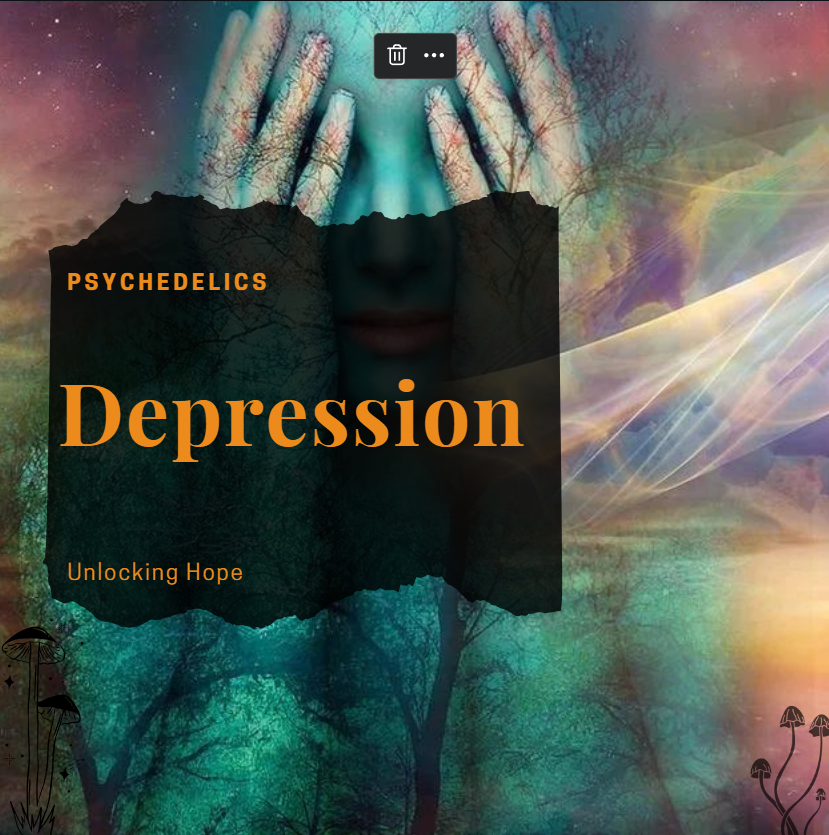
In today’s fast-paced world, depression has become a prevalent mental health concern, affecting millions of individuals worldwide. Despite advancements in traditional therapies, many people continue to struggle with finding relief from their symptoms. However, a promising breakthrough has emerged in the form of psychedelic therapies, offering new hope for those battling depression. In this comprehensive article, we will explore how psychedelic therapies can effectively alleviate symptoms of depression and provide a path towards healing and transformation.
Understanding the Impact of Depression:
Before delving into psychedelic therapies, it’s crucial to grasp the profound impact that depression can have on an individual’s life. Depression is more than just feeling sad or blue; it can manifest as persistent feelings of hopelessness, worthlessness, and despair. It can disrupt daily functioning, strain relationships, and lead to physical health issues if left untreated. Recognizing the severity of depression underscores the importance of exploring alternative treatment options.
The Rise of Psychedelic Therapies:
In recent years, psychedelic therapies have garnered increasing attention for their potential to address mental health conditions, including depression. These therapies typically involve the controlled use of psychedelic substances such as psilocybin (found in magic mushrooms) or MDMA (commonly known as ecstasy) in conjunction with psychotherapy sessions. Unlike traditional antidepressants, which may take weeks or months to produce results, psychedelic therapies offer rapid relief and lasting benefits after just a few sessions.
How Psychedelics Work in the Brain:
To understand the therapeutic effects of psychedelics, it’s essential to examine their impact on the brain. Psychedelics work by modulating serotonin receptors in the brain, leading to altered states of consciousness and enhanced introspection. They promote neural plasticity and create opportunities for profound insights and emotional healing. Research suggests that psychedelics can disrupt rigid patterns of thinking and behavior, allowing individuals to break free from negative thought loops associated with depression.
The Evidence Supporting Psychedelic Therapies:
Numerous clinical studies have demonstrated the efficacy of psychedelic therapies in treating depression. For example, research conducted at prestigious institutions such as Johns Hopkins University and Imperial College London has shown that a single dose of psilocybin can produce significant and sustained reductions in depressive symptoms. Similarly, MDMA-assisted therapy has shown promising results in treating post-traumatic stress disorder (PTSD), which often co-occurs with depression.
The Therapeutic Process:
Psychedelic therapy sessions are carefully structured and supervised by trained therapists to ensure safety and efficacy. Before the session, individuals undergo thorough screening and preparation to address any concerns and set intentions for the experience. During the session, participants are encouraged to explore their inner landscape while receiving guidance and support from therapists. Afterward, integration sessions help individuals make sense of their experiences and apply insights to their daily lives.
Overcoming Stigma and Misconceptions:
Despite the growing body of evidence supporting psychedelic therapies, stigma and misconceptions persist. Some skeptics view psychedelics as dangerous or addictive substances, overlooking their potential therapeutic benefits when used in a controlled and supervised setting. By dispelling myths and educating the public, we can pave the way for greater acceptance and accessibility of psychedelic therapies for those in need.
The Future of Mental Health Treatment:
As research into psychedelic therapies continues to evolve, the future of mental health treatment looks promising. With ongoing clinical trials and regulatory approvals, psychedelic-assisted therapy could soon become a mainstream option for individuals struggling with depression and other mental health conditions. By embracing innovation and exploring new avenues for healing, we can usher in a new era of hope and transformation in the field of mental health.
In conclusion, psychedelic therapies offer a beacon of hope for individuals grappling with depression. By harnessing the therapeutic potential of psychedelics in conjunction with psychotherapy, we can unlock new pathways to healing and liberation from the grip of depression. As awareness grows and stigma diminishes, psychedelic therapies have the potential to revolutionize mental health treatment and empower individuals to reclaim their lives.
